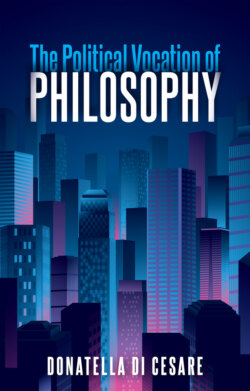Читать книгу The Political Vocation of Philosophy - Donatella Di Cesare - Страница 9
4 The pólis: a calling
ОглавлениеRather than give a classic definition of philosophy, this book prefers to interrogate its intemporal element, put to the test by the demands of the time. This means that it proposes a political-existential reflection, or better, an existential and political reflection, on philosophy’s fate, on its role, on its potential in the era of technocapitalism and neoliberal governance.
Philosophy has always been harried, attracted, cajoled by two ruinous temptations. The first is that of closing in on itself, abstracting itself completely from the world. The second is that of completely casting off its own self, becoming absolutely other. Given that this has always happened, it would be bizarre to get carried away by assertions of ‘unprecedented’ developments. But these two temptations are today being conjugated in a double closure, perhaps even making their effects more powerful and intense.
What margin is there for thought, if it is gripped by fear at stepping into the outside – if what everywhere dominates is a diffuse exophobia? Where knowledges are handed over to calculation and to technologically assisted simulation; where procedures of simplification spread, peddled as truth-procedures; and where all understanding has its own place and performative function – then philosophy ends up being divested of its role. The sheer compactness of the saturated world demands a knowledge-regime which indulges it and remains within the prescribed limits.
If each ambit of knowledge is based on some problem, then philosophy poses a problem to the problems. It interrogates even the interrogator, knocking him out of his position, deposing him from his pulpit, and making him into the interrogated. The philosopher cannot escape this continual interrogation, which is, in a sense, a moment of splitting which takes the form of a question to the question.
Philosophy has forever been atopic; and in a world without an outside, it is dangerously out of place. A thinking-beyond, a vocation of the beyond, it seems unclassifiable, impossible to set within confines. Philosophy’s territory is a paradoxical one, deterritorialised and inhabited by atopia. In its decentring movement, philosophy emigrates toward an outside from which it turns order upside down. To think estranges – makes foreign.
This book travels a path which follows the two trajectories of existence and politics, and whose time is patterned by three Greek words: atopía, uchronía and anarchía. If, in their close connection they preserve their alpha privative – the tension internal to philosophy – with their synergy they bring the critical impulse out into the open. They let its promised explosive charge to filter out into the beyond.
Thus, in touching on a theme subject to a prohibition – a verdict almost beyond appeal – this book summons philosophy back to its political vocation. This vocation is understood in terms of a reciprocal relation, where philosophy is not only inspired by the pólis but aspires to the pólis. It is, therefore, a political vocation because its inclination is to be found in the pólis itself. Thus, philosophy is summoned to make its return, without ever forgetting that it is out of place and out of step with the times – particularly in the city. After a long absence in which it has lost its voice, philosophy is called on, invited to draw the community back into the light, to reawaken it. For no community can do without an alert philosophy keeping watch.
Heraclitus said as much, and Plato backed this up in his great political dialogue, the Republic. It is not enough to think as in a ‘dream’, ónar, in a dreamlike condition. The thinking of whoever is alert, awake, in fact proves to be something quite different (see the Republic, 476c). The waking vision, húpar, is the very characteristic of philosophy, its distinctive trait, to the point of becoming its symbol. One can spend one’s life asleep, or else awake and keeping watch. Those who do not philosophise doubtless do live. But their existence is diminished, their participation in politics compromised.
